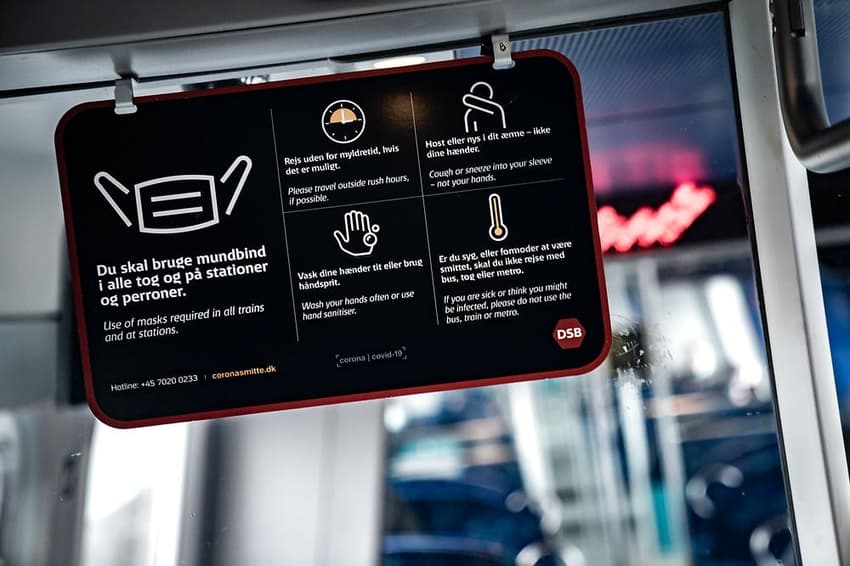Danish public transport face mask requirement to continue until April

Current restrictions and requirements on Denmark’s public transport have been extended until April 15th, the Ministry of Transport has confirmed.
Restrictions affecting domestic transport as well as rules at airports will thereby continue until mid-April, the ministry said in a statement.
The announcement follows yesterday’s confirmation that some of the current national coronavirus restrictions – primarily in relation to shops and senior school classes – will be lifted in part on Monday, March 1st.
READ ALSO:
- Denmark lifts UK entry ban but extends all other Covid-19 travel restrictions until April
- Denmark announces easing of Covid-19 restrictions: Limited opening of schools and shops
- Which Covid-19 restrictions will stay in place in Denmark beyond March 1st?
The political agreement to lift some restrictions in March included an understanding that transport restrictions would continue in their current form, the ministry wrote.
As such, face masks will still be required on public transport as well as during driving tests. Children under the age of 12 and people with relevant health reasons are exempted from the requirement. Buses, trains and Metro trains must operate at half capacity.
Passengers will continue to be barred from boarding flights to Denmark if they cannot present a negative Covid-19 test taken with the last 24 hours at the time of boarding. The rule applies to Danish citizens and Danish residents but not on domestic flights or flights from Greenland or the Faroe Islands.
The transport restrictions also prevent crew and passengers from cruise ships from going on land in Denmark unless special permission has been given.
More information about border and entry rules can be found here.
“The government would like to open as much as possible and we are going as far as we can in relation to health authority recommendations. That’s why it is also important that we stick to all the good measures with face masks and hygiene, as we are used to,” transport minister Benny Engelbrecht said in the statement.
“Additionally, I encourage taking the bicycle on short journeys and trying to travel outside of peak times,” the minister added.
Comments
See Also
Restrictions affecting domestic transport as well as rules at airports will thereby continue until mid-April, the ministry said in a statement.
The announcement follows yesterday’s confirmation that some of the current national coronavirus restrictions – primarily in relation to shops and senior school classes – will be lifted in part on Monday, March 1st.
READ ALSO:
- Denmark lifts UK entry ban but extends all other Covid-19 travel restrictions until April
- Denmark announces easing of Covid-19 restrictions: Limited opening of schools and shops
- Which Covid-19 restrictions will stay in place in Denmark beyond March 1st?
The political agreement to lift some restrictions in March included an understanding that transport restrictions would continue in their current form, the ministry wrote.
As such, face masks will still be required on public transport as well as during driving tests. Children under the age of 12 and people with relevant health reasons are exempted from the requirement. Buses, trains and Metro trains must operate at half capacity.
Passengers will continue to be barred from boarding flights to Denmark if they cannot present a negative Covid-19 test taken with the last 24 hours at the time of boarding. The rule applies to Danish citizens and Danish residents but not on domestic flights or flights from Greenland or the Faroe Islands.
The transport restrictions also prevent crew and passengers from cruise ships from going on land in Denmark unless special permission has been given.
More information about border and entry rules can be found here.
“The government would like to open as much as possible and we are going as far as we can in relation to health authority recommendations. That’s why it is also important that we stick to all the good measures with face masks and hygiene, as we are used to,” transport minister Benny Engelbrecht said in the statement.
“Additionally, I encourage taking the bicycle on short journeys and trying to travel outside of peak times,” the minister added.
Join the conversation in our comments section below. Share your own views and experience and if you have a question or suggestion for our journalists then email us at [email protected].
Please keep comments civil, constructive and on topic – and make sure to read our terms of use before getting involved.
Please log in here to leave a comment.